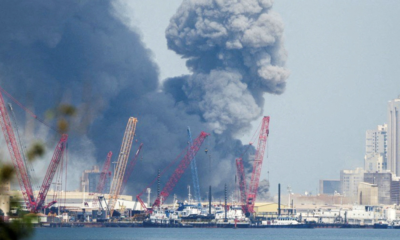Trump Presidency
Oil Prices Soar, Stock Markets Plunge After Israel Strikes Iran in Escalating Middle East Conflict
Global markets were thrown into turmoil on Friday after Israel launched airstrikes on Iran, targeting its nuclear facilities in a bold and highly provocative move that triggered immediate retaliatory drone action from Tehran. The unexpected escalation between the two regional powers, Israel and Iran, has raised fears of a broader Middle East conflict, prompting sharp reactions in energy markets, oil prices and stock exchanges worldwide.
Crude oil prices spiked dramatically, marking the most significant single-day surge since Russia’s invasion of Ukraine in 2022. The U.S. oil benchmark, West Texas Intermediate, shot up toward $73 per barrel, threatening to reverse recent declines in gasoline prices that have been instrumental in keeping US inflation under control.
According to the Labor Department, gasoline prices had dropped by 12% over the past year, helping to ease pressure on household budgets and giving the Federal Reserve room to consider potential interest rate cuts. However, the fresh volatility from the Middle East could throw those plans into disarray.
Stock Market Rattled by Conflict Fears
The impact was also felt on Wall Street, where investor sentiment rapidly turned bearish. The Dow Jones Industrial Average plummeted nearly 500 points, down about 1.1% within the first two hours of trading. Other major indices followed suit, with the S&P 500 and Nasdaq Composite both experiencing steep losses.
Typically, geopolitical instability prompts investors to seek the safety of US Treasury bonds, which in turn drives yields lower. But in a surprising twist, bond yields remained stubbornly high. Analysts point to growing concerns over the ballooning US federal deficit, which has already exceeded $1.2 trillion with four months still remaining in the fiscal year.
Global Repercussions Could Be Imminent
The potential for supply chain disruptions in global oil markets has experts warning of cascading effects. Both Iran and Israel sit in a region responsible for nearly a third of the world’s crude oil production, and any long-term disruption could send oil prices surging far beyond Friday’s spike.
Such an outcome would not only affect drivers at the pump but also reignite inflationary pressures globally, challenging the stability of economies that are still recovering from the COVID-19 pandemic and ongoing supply chain challenges.
What Happens Next?
While the full scope of the Israel-Iran military confrontation remains uncertain, its economic impact is already being felt across global markets. If tensions escalate further, experts warn that both inflation and interest rates could be forced upward once again, potentially delaying economic recovery and impacting everything from housing to groceries.











































Pingback: Did Pentagon Pizza Report Blow US Cover in Israel-Iran Conflict?